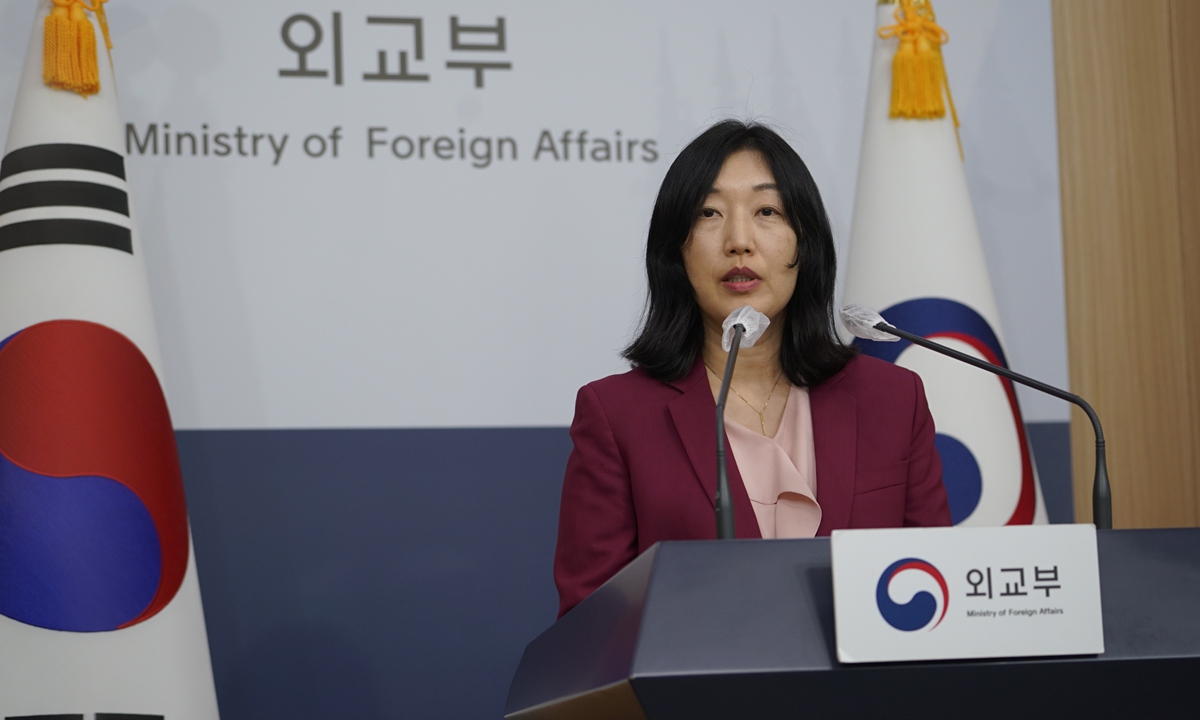
South Korean Foreign Ministry Deputy Spokesperson Ahn Eun-ju speaks at a press conference in Seoul, South Korea on August 4. She stressed that the South Korean government adheres to the one-China principle.Photo: VCG
South Korean President Yoon Suk-yeol's "unfortunate" absence from a meeting with visiting Speaker of US House of Representatives Nancy Pelosi is seen by Chinese experts as a way to avoid embarrassment, as Pelosi's recent visit to the island of Taiwan has irritated China and caused tensions in the region. It may have dawned on the South Korean leader that whoever plays high-profile host to Pelosi at this sensitive moment could risk provoking China, experts said.
Pelosi met South Korean National Assembly Speaker Kim Jin-pyo and other senior members of parliament on Thursday. Pelosi and her delegation later spoke by phone with Yoon on the two countries' alliance, foreign policy and other issues. Yoon is on vacation this week, while South Korean Foreign Minister Park Jin headed to Cambodia on Wednesday to attend a series of ASEAN meetings.
Yoon, who is believed to be at home in Seoul, was at a theater and then had dinner with some actors on Wednesday night when Pelosi arrived, the Financial Times reported.
Pelosi and her parliamentary delegation arrived in South Korea Wednesday night after making a stop on the island of Taiwan, an unconfirmed destination on her Asian tour, which has provoked strong opposition and condemnation from China and the international community.
When Pelosi last visited South Korea in 2015, she met with then president of Korea, Park Geun-hye, and then foreign minister, Yun Byung-se.
This time, Yoon had a 40-minute phone conversation with Pelosi, during which Yoon and Pelosi affirmed their commitment to the South Korea-US alliance and asked for her continued support for the development of a global comprehensive strategic alliance between the two countries, reported Korea Joongang Daily.
During the phone conversation, Pelosi and other members of her congressional delegation did not bring up the Taiwan question, and Yoon didn't raise the matter either, AP quoted Yoon's office as saying.
Shortly before the phone call, Pelosi met with National Assembly Speaker Kim Jin-pyo and discussed regional security and economic cooperation, according to the report.
According to AP, Pelosi did not directly mention her Taiwan visit or China's anger on this issue.
Experts said the South Korean president avoided an awkward meeting with Pelosi as it is clear that any country that plays high-profile host to Pelosi who has just stirred up tensions across the Taiwan strait could risk antagonizing China.
"The South Korean government would be in a very embarrassing situation if Pelosi's meeting were with the president or foreign minister and Taiwan-related topics were brought to the table by the US side, which was quite possible considering she just left the island and drew a huge reaction in the region," Lü Chao, an expert on Korean Peninsula issues at the Liaoning Academy of Social Sciences, told the Global Times.
"Seoul would not want to anger China at this point or have any confrontation with the US over the topic of the Taiwan question. Thus, the South Korean government's arrangement of having its National Assembly Speaker meet with Pelosi both looks polite and preserves its national interests," he said.
Some observers in South Korea shared that view. Kim Heung-kyu, director of the US-China Policy Institute at Ajou University, said the president or the foreign minister would have tried to hold talks with the No.3 politician in the US in the past, but the government seems to have decided not to excessively politicize Pelosi's visit this time and unnecessarily irritate China, reported the Guardian.
Analysts said that South Korea's arrangements in receiving Pelosi also showed that the US' increasing pressure on South Korea to choose sides between it and China has put the Yoon government in an embarrassing situation, and closely following the US to counter China will not fit the interests of South Korea and endanger its relations with China.
When asked about whether the country's position would change after Pelosi's visit to Taiwan, a South Korean Foreign Ministry spokesperson said at a press conference on Thursday that South Korea has always adhered to the one-China principle.
The government is paying close attention to the situation across the Taiwan Strait, said the spokesperson.
Chinese Ambassador to South Korea Xing Haiming said on Tuesday that Pelosi's visit to Taiwan is a serious blow to the regional situation and will lead to extremely serious developments and consequences, reported Korea Daily News.
In addition to the Taiwan question, experts noted that if Pelosi meets with Yoon, it may put pressure on South Korea to join the US-led alliance known as "Chip 4", which would include the US, Japan, South Korea and Taiwan. The proposed alliance is believed to be aimed at China, as chips are an important South Korean export to China.
The US is South Korea's ally and China is a significant trade partner as well as neighbor of South Korea. How to coordinate bilateral relations with the two countries to maintain a balance and maximize South Korea's interests has become one of the most challenging tasks for the Yoon government, observers said.




